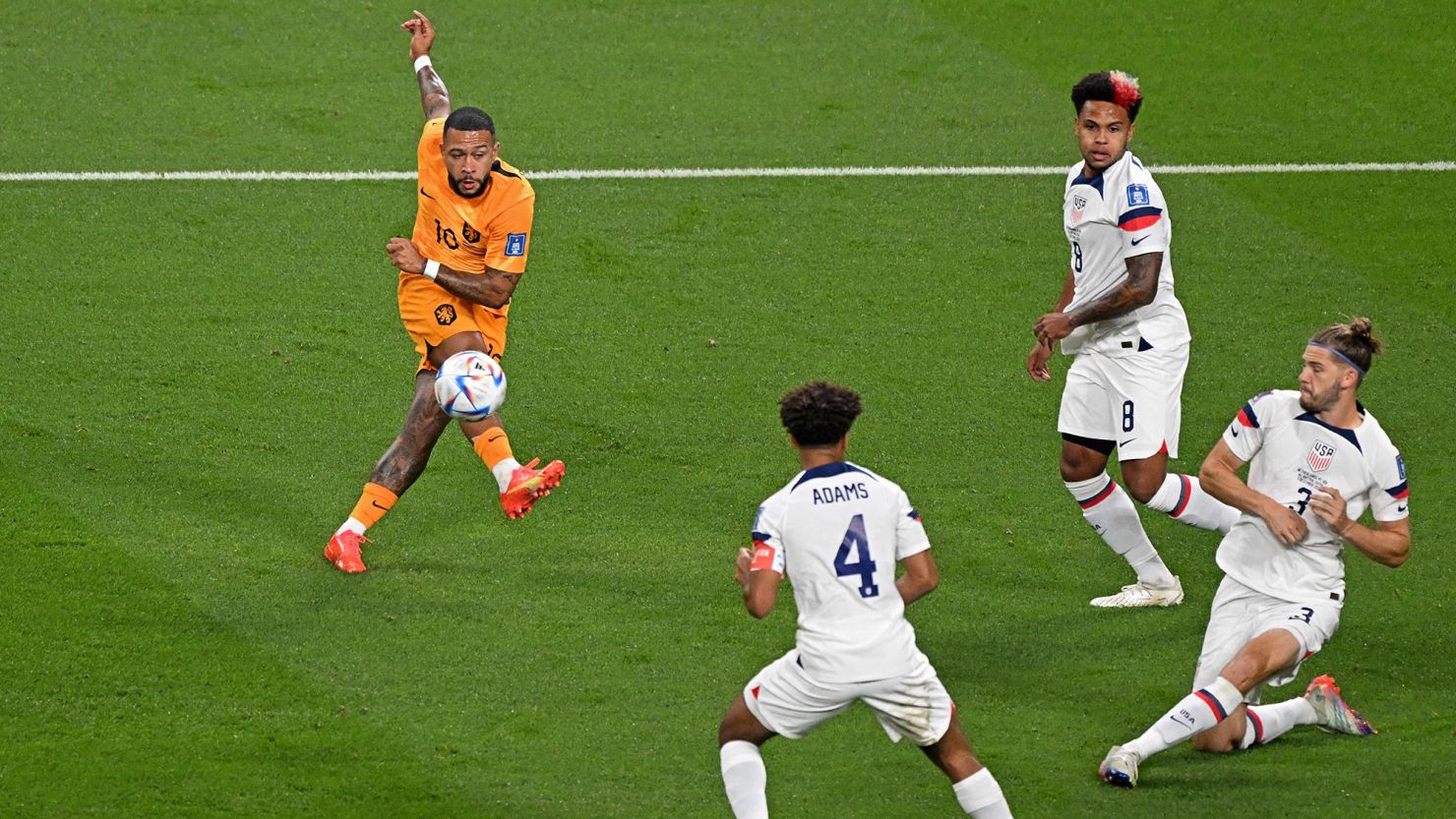Editor’s Note: Amy Bass (@bassab1) is professor of sport studies at Manhattanville College and the author of “One Goal: A Coach, a Team, and the Game That Brought a Divided Town Together” and “Not the Triumph but the Struggle: The 1968 Olympics and the Making of the Black Athlete,” among other titles. The views expressed here are solely hers. Read more opinion on CNN.
“There are only two things I can’t stand in this world,” Michael Caine announces as Nigel Powers in the Austin Powers film “Goldmember.” “People who are intolerant of other people’s cultures…and the Dutch.”

At Khalifa International Stadium on Saturday, the US Men’s National Team (USMNT) likely left the pitch with a similar sentiment, having been handed a punishing 3-1 loss by the Netherlands in the first match of the men’s World Cup’s knockout round.
The last time a US team faced the Netherlands in World Cup play was 2019, when the women’s side grabbed a 2-0 victory with goals from Megan Rapinoe and Rose Lavelle to defend its championship crown. On Saturday in Qatar, however, it went down a bit differently.
For much of the match, Dutch powerhouse players like Memphis Depay and Denzel Dumfries looked to be running a soccer clinic, scoring twice in the first half on cutback crosses. Meanwhile, the Americans, for much of the time, just seemed to be, well, running.
The Netherlands are the most powerful men’s soccer team yet to win a World Cup, most recently coming up short against Spain in 2010 in overtime. After failing to qualify, like the US, for 2018, this team – which conceded only one goal during group play – absorbed early American energy with mercenary skill, including a failed opportunity by US phenom Christian Pulisic that threw the first vestiges of dread into the air, a reminder of what a game of inches is all about.
Mere minutes later, a sweeping Dutch drive across the field ended with Memphis finding the net despite the best efforts of US keeper Matt Turner.
A second Dutch goal just before the half all but closed the door, with a mere glimmer of hope with a chaotic goal by the US in the second half, a Pulisic pass to the center that Haji Wright – who entered as a substitute – was able to graze with the outside of his right foot just enough to land it inside the left post and past the 6-foot-8 Dutch keeper, Andries Noppert (who otherwise seemed to be getting taller by the minute). A wide-open Dumfries soon extinguished all hope, left footing the ball for a third goal for the Netherlands.
It was done. The USMNT is going home. For many American soccer fans, attention now turns to the number of days left to count until the US Women’s National Team (USWNT) takes the field for the Women’s World Cup, to be held next year in Australia and New Zealand.
And yet, in so many ways, it feels like the story of men’s soccer in the United States is just beginning, yet again. The USMNT arrived in Qatar as the second-youngest team in the tournament, and hit the pitch against the Netherlands as the youngest squad remaining. The depth, grit and determination of these young men became the headline.
While occasionally bogged down by the throes of immaturity and naiveté – and nowhere more than against an unforgiving Dutch squad – they showed little fear, perhaps exemplified when Captain America, as Christian Pulisic is often called, put his body on the line to score the team’s one goal against Iran, enduring a pelvic contusion that sent him to the hospital at the half.
While Pulisic has been a game-changing face for the men’s side, he is surrounded by a wealth of talent. In Qatar, the US defense has tirelessly worked as the engine of this team, with Turner (the walk-on from Fairfield University turned keeper for Arsenal in the Premier League, a poster boy for never giving up on a dream) and the backline manufacturing a veritable wall against anyone who made it into the final third of the pitch. Captain Tyler Adams, as smooth in pressers as he is on the field, has logged more miles in group play against Wales than anyone – ever.
US fans have taken note, buying more tickets to these matches than any other fan base except for the Qataris themselves, and making their presence known with costumes that range from Uncle Sam to the Statue of Liberty and the now infamous “It’s Called Soccer!” chant ringing throughout the seats during the 0-0 group battle against England.
Fans at home, too, have tuned in: an average 12 million watched the win-or-go-home match against Iran on Fox, with millions more streaming the match online, and thousands of people gathering in public spaces – including America’s classrooms, where students (and I can personally attest to this) are using phones and laptops to watch the world’s men’s teams do battle.
That people care about this team is important, as it is the first that will bring home winnings under the new collective bargaining agreement with US Soccer that followed the settlement of the gender discrimination lawsuit filed by members of the US Women’s National Team (not for nothing: the Dutch were the first to put an equal pay scale into place for its men’s and women’s teams).
The settlement with US soccer ensured that as well as rate of pay, World Cup bonuses would be equal for men and women, with the teams releasing a joint statement that announced how they would “proudly stand together in a shared commitment to advancing equality in soccer.”
The subsequent collective bargaining agreement outlines how money from FIFA will be evenly distributed amongst the US teams, correcting the egregious fact that the women historically had received less money to win it all than the men had to finish on the bottom. In 2019, for example, the women’s purse combined at $30 million; the cash for next year’s tournament is forecast at $60 million. This year in Qatar, however, the men’s prize money tops $440 million.
Get our free weekly newsletter
- Sign up for CNN Opinion’s newsletter.
- Join us on Twitter and Facebook
As the USMNT bows out of the World Cup, the women will see some $6.5 million from the money gained by the men’s team reaching the knockout stage – more than they received for their tournament victories in 2015 and 2019…combined.
As the men’s team returns home, then, there is much to be proud of: qualifying for the tournament in the first place, making it into the round of 16, and helping their female counterparts (who take to the pitch in just over 200 days with unprecedented ticket sales) when the sport’s international organizing body has failed to.





